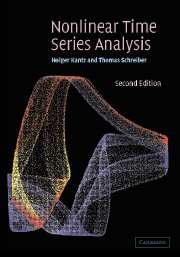Book contents
- Frontmatter
- Contents
- Preface to the first edition
- Preface to the second edition
- Acknowledgements
- I Basic topics
- II Advanced topics
- 9 Advanced embedding methods
- 10 Chaotic data and noise
- 11 More about invariant quantities
- 12 Modelling and forecasting
- 13 Non-stationary signals
- 14 Coupling and synchronisation of nonlinear systems
- 15 Chaos control
- A Using the TISEAN programs
- B Description of the experimental data sets
- References
- Index
12 - Modelling and forecasting
Published online by Cambridge University Press: 06 July 2010
- Frontmatter
- Contents
- Preface to the first edition
- Preface to the second edition
- Acknowledgements
- I Basic topics
- II Advanced topics
- 9 Advanced embedding methods
- 10 Chaotic data and noise
- 11 More about invariant quantities
- 12 Modelling and forecasting
- 13 Non-stationary signals
- 14 Coupling and synchronisation of nonlinear systems
- 15 Chaos control
- A Using the TISEAN programs
- B Description of the experimental data sets
- References
- Index
Summary
When we try to build a model of a system, we usually have the ultimate goal of establishing the equations of motion which describe the underlying system in terms of meaningful quantities. Writing down the behaviour of the relevant components of the system in a mathematical language, we try to combine all we know about their actions and interactions. This approach may allow one to construct a simplified but useful image of what happens in nature. Most of the knowledge we have about the inherent mechanisms has been previously derived from measurements. We call such models phenomenological models. In some cases, as in classical mechanics, one is able to derive a dynamical model from first principles, but even the so-called first principles have to be consistent with the empirical observations.
In order to establish a useful phenomenological model, one needs specialised knowledge about the system under study. Therefore, the right place to explain how to make a model for the time variations of some animal population is a book on population biology. On the other hand, there are techniques for constructing models that are based almost purely on time series data. These techniques are generally applicable and thus we consider their treatment appropriate for this book.
The problem treated in this chapter lies at the heart of time series analysis. What can we infer about the dynamical laws governing a system, given a sequence of observations of one or a few time variable characteristics of the system? We suppose that the external knowledge about the system is limited to some assumptions that we may make about the general structure of these laws.
- Type
- Chapter
- Information
- Nonlinear Time Series Analysis , pp. 234 - 274Publisher: Cambridge University PressPrint publication year: 2003



